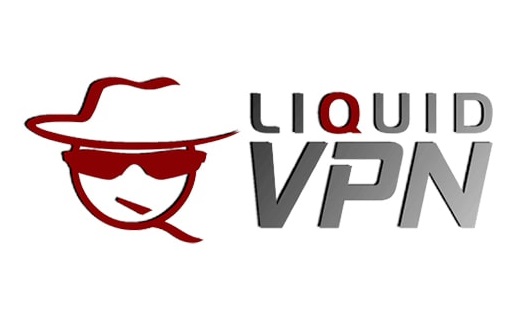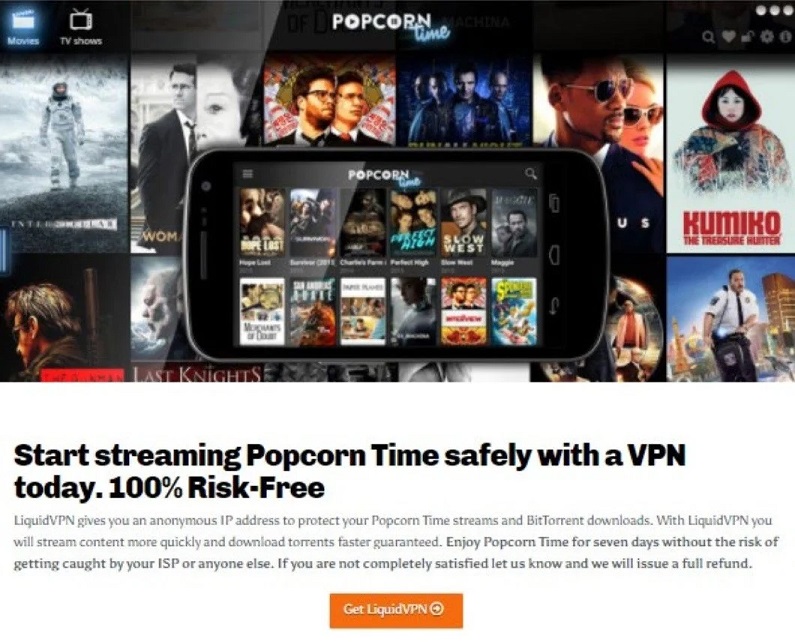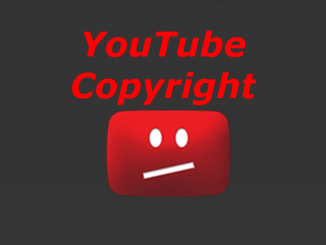
A group of filmmakers has won over $14 million in damages from VPN provider LiquidVPN. The default judgment finds the company guilty of copyright infringement and DMCA violations, in part by promoting the Popcorn Time app. The order also awards $250,000 in trademark damages in favor of 42 Ventures, which owns the Popcorn Time trademark.
A few years ago piracy-related lawsuits were pretty straightforward. Copyright holders would either sue alleged file-sharers or the operators of pirate sites.
More recently, we have seen a new breed of lawsuits filed on behalf of the makers of movies such as “Angel Has Fallen”, “Dallas Buyer’s Club”, “Hellboy” and “Rambo V: Last Blood”.
These lawsuits target VPN providers, which are generally seen as third-party intermediaries. This includes LiquidVPN. The company was taken to court in March last year, shortly after the former owner was sued in a separate lawsuit.
The new owner, Puerto Rico company 1701 Management, is allegedly linked to U.S. resident Mr. Muszynski, who continued operating the service. While running a VPN doesn’t equal copyright infringement, the movie companies accused the service of encouraging and facilitating piracy.
‘Popcorn-Time VPN’
The complaint mentioned a variety of examples where the defendants directly or indirectly referenced copyright-infringing activity. This includes a screenshot of Popcorn Time which shows the Millennium film Survivor. The movie companies argue that, through various public statements, LiquidVPN ‘encouraged’ users to use its service to pirate movies.
“The LiquidVPN Defendants describe their VPN service as a tool to ‘Watch Popcorn Time without being detected by your ISP and P2P tracking software’ and promote it as a tool that can be used to pirate copyright protected content ‘without the risk of getting caught by your ISP or anyone else’,” they wrote.
Despite the serious allegations, 1701 Management and its alleged owner failed to respond in court. As such, the film companies requested a default judgment. This request was initially denied, as other defendants in the case had yet to resolve their disputes, but last week the filmmakers got the green light.
In the request for a default judgment, the rightsholders asked for nearly $10 million in copyright infringement damages, for a total of 66 films. They also sought millions in damages for DMCA violations, as well as damages for trademark infringement.
Court Issues Default Judgment
This week, Florida federal Judge Beth Bloom granted most of the demands. Without LiquidVPN putting up a defense, the court relied on the accusations of the filmmakers, which were properly plead and accepted as true.
“LiquidVPN Defendants intentionally induced and encouraged direct infringement of users of Popcorn Time,” Judge Bloom writes, adding that the VPN provider is liable for direct, contributory and vicarious copyright infringement.
The court stresses that the defendants don’t qualify for safe harbor protection, as they didn’t have a known repeat infringer policy or a registered DMCA agent.
“LiquidVPN Defendants have no safe harbor from liability because they fail to implement a policy for terminating repeat infringers and have not registered a DMCA agent with the Copyright office,” Judge Bloom adds.
Millions in Damages
The list of infringed films is 66 titles long and includes “After We Collided”, “Angel Has Fallen”, “Dallas Buyer’s Club”, “Hellboy”, “Hunter Killer”, “Rambo V: Last Blood”, “Survivor”, “The Hitman’s Bodyguard”, and “Wild Horses”.
For all these films, the LiquidVPN defendants have to pay the maximum statutory damages for copyright infringement, set at $150,000 per work. That adds up to a total of $9.9 million. In addition, they have to pay $4.9 million for altering copyright management information, which violates the DMCA.
The court also granted the request for a permanent injunction that requires LiquidVPN to block the piracy websites included in USTR’s annual overview. Those include The Pirate Bay, RARBG, and YTS. In addition, it must implement a repeat infringer policy.
Whether LiquidVPN will comply with these requests is unknown. The homepage has been offline for a few months now, but the user panel where people can place new orders still appears to be operational.
Popcorn Time Trademark
In addition to the copyright-related damages, Judge Bloom also awarded $250,000 in trademark infringement damages to the Hawaiian company 42 Ventures. This company is owned by anti-piracy attorney Kerry Culpepper, who previously registered the “Popcorn Time” trademark.
Two years ago, Culpepper used this trademark to suspend the Twitter account of a popular Popcorn Time fork. In the present case, LiquidVPN was successfully accused of using the trademark without authorization.
“LiquidVPN Defendants have intentionally used Plaintiff 42’s Mark Popcorn Time in U.S. commerce without authorization or license by using the name ‘Popcorn Time VPN’ to promote their VPN service to use the piracy application Popcorn Time,” Judge Bloom writes.
As far as we know, this is the first default judgment against a VPN provider. Other companies including VPN Unlimited and VPN.ht have been sued as well, but these settled their disputes out of court.
—
A copy of U.S. District Court Beth Bloom’s final default judgment and permanent injunction is available here (pdf)
Source: ![]() TorrentFreak.com
TorrentFreak.com








Be the first to comment